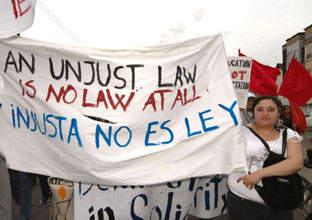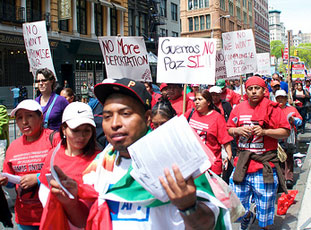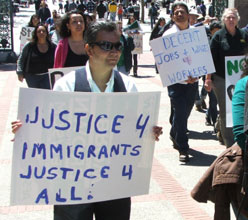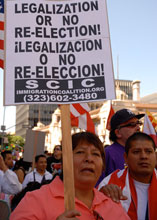Legalization for All Now
• States Resisting DHS Demands to Share Fingerprint Data For Deportations
• House Bill Calls for Indefinite Detention of Immigrants
• En Masse Pleas Allowed in Immigration Hearings
• Federal Government, Prison Monopolies and State Governments Partner to Build More Detention Centers
• Prison Companies Push for Laws Increasing Detentions
Illinois & California Reject “Secure Communities”
States Resisting DHS Demands to Share Fingerprint Data For Deportations
 The state of Illinois recently requested to opt out of the federal government’s “Secure Communities” program. “Secure Communities” is a federal program that requires state and local governments to forward the fingerprints of anyone simply arrested, not convicted, to the Department of Homeland Security (DHS) for review by its Immigration and Customs Enforcement (ICE). While the program, started in 2008, was initially promoted as voluntary, the Department of Homeland Security (DHS) has been systematically demanding that those requesting to opt-out cannot do so. In addition, federal officials have warned that any state that declines to share fingerprints through the program will lose access to the criminal databases of other states and the federal government, directly undermining local policing efforts.
The state of Illinois recently requested to opt out of the federal government’s “Secure Communities” program. “Secure Communities” is a federal program that requires state and local governments to forward the fingerprints of anyone simply arrested, not convicted, to the Department of Homeland Security (DHS) for review by its Immigration and Customs Enforcement (ICE). While the program, started in 2008, was initially promoted as voluntary, the Department of Homeland Security (DHS) has been systematically demanding that those requesting to opt-out cannot do so. In addition, federal officials have warned that any state that declines to share fingerprints through the program will lose access to the criminal databases of other states and the federal government, directly undermining local policing efforts.
Illinois is one of 42 states to agree to the program, which is currently being used in 1,265 jurisdictions. The Obama administration aims to expand the program to every state and county by 2013. Everywhere, broad opposition exists to the program and the great increase in unjust detentions and deportations it has caused.The program, and particularly its deportations, can readily be ended or temporarily suspended by Obama. It is not mandated by law, but rather was developed by DHS, which has discretion concerning deportations.
The federal government promotes the program as a means for ICE to identify immigrants they consider “dangerous criminals.” In fact, its own statistics, secured through demands by rights activists, show that overall, since its launch in 2008, more than 30 percent of those deported had no criminal convictions and more than half either no convictions or only minor misdemeanors, including traffic violations like a broken taillight.
The Illinois request to opt out was made by Governor Pat Quinn, who gave facts showing that many of those from Illinois who were deported were not convicted of any crime. In a letter to DHS, Quinn said that Illinois police would no longer participate in “Secure Communities” and that all jurisdictions within the state would terminate their relationships with the DHS program.
 Other locations, such as San Francisco, Denver and Arlington, Virginia have also attempted to opt out and been told by DHS that they cannot do so. Providence, Rhode Island is also considering opting out. As well, California has a bill pending allowing counties and local communities to opt out and for the state to do so as well. Illinois also has legislation pending in addition to the Governor’s request. New York is considering opting out, with activists bringing forward that since January, 80 percent of those detained under “Secure Communities” have not been convicted of any crime and for many counties, half of those deported were not convicted of any crime.
Other locations, such as San Francisco, Denver and Arlington, Virginia have also attempted to opt out and been told by DHS that they cannot do so. Providence, Rhode Island is also considering opting out. As well, California has a bill pending allowing counties and local communities to opt out and for the state to do so as well. Illinois also has legislation pending in addition to the Governor’s request. New York is considering opting out, with activists bringing forward that since January, 80 percent of those detained under “Secure Communities” have not been convicted of any crime and for many counties, half of those deported were not convicted of any crime.
Before “Secure Communities” was instituted, fingerprints of those arrested would be sent to the FBI national database, but not to immigration. Under “Secure Communities,” they are forwarded to ICE, which has the ability to place a 48-hour hold, known as a “detainer,” on anyone it “suspects” is undocumented. This hold can be imposed whether the person arrested had charges dropped, would otherwise be released on bail, has been found not guilty or been convicted of a misdemeanor. ICE then determines whether the person is undocumented and has them deported. The arbitrary nature of this determination can be seen in the fact that citizens and permanent residents have been caught up in these deportations, as ICE simply claims their documentation is not valid. DHS admits the program has contributed to the record numbers of deportations since Obama was elected.
In addition to deporting large numbers of people, the program involves local and state police in immigration enforcement, under federal dictate. ICE is called to the local jails and fosters relations with the local police, encouraging immigration enforcement by local Sheriff’s. Arizona’s Maricopa County Sheriff Joe Arpaio — notorious for racist profiling, mass detentions, parading immigrants in shackles and pink underwear and other actions to humiliate people — is a product of the federal government’s “Secure Communities.” The program has generated broad racist profiling and the terrorizing of immigrant communities wherever it is implemented. This includes using police roadblocks to stop and question people simply driving that day, arresting anyone unable to produce documentation and turning them over to ICE.
Conflict Between States and Federal Government
A main feature of the current contention is the effort by the federal government to dictate to local and state governments. The federal government wants control over immigration, while also engaging local and state police in immigration enforcement. Programs like “Secure Communities” serve as mechanisms to integrate the local and state police agencies with federal agencies, under federal command. This is necessary in current conditions where increasing regimentation and repression of the workforce is required for U.S. the fascist arrangements the rulers are imposing.
Currently, “Secure Communities,” is instituted through concerted efforts by the federal government to secure a Memorandum of Understanding (MOU) with the state or county, commonly through the state attorney general’s office, state police or county sheriff. ICE conducts major campaigns to gain such support.
The MOU’s commonly include termination language. For example, the MOU between DHS and the California Department of Justice dated January 23, 2009 in the section titled “Modifications and Termination,” reads:
"This MOA may be modified at any time by mutual written consent of both parties.
"This MOA may remain in effect from the date of signing until it is terminated by either party. Either party, upon written or oral notice to the other party, may terminate the MOA at any time. A termination notice shall be delivered personally or by certified or registered mail and termination shall take effect 30 days after receipt of such notice."
The same section of the MOA between DHS and the Illinois State Police, available online along with other Secure Communities documents, has the same wording. Yet DHS is insisting that state and local governments cannot opt out and threatening reprisals if they attempt it.
Much like monopolies dictating to steel and autoworkers, and state governments dictating to public workers, where both unilaterally decide a contract is not a contract, now we are witness to the federal government dictating to the states that a contract is not a contract. The federal government is indicating that it will decide what states and counties do in relation to immigration. This includes having ICE dictate that local and state governments engage in immigration enforcement, even when it is contrary to local laws and when state and local elected officials say no.
 San Francisco, for example, is a sanctuary city, where local police agencies are not permitted to ask about immigration status or enforce immigration law. San Francisco Sheriff Michael Hennessy has twice tried to opt out of “Secure Communities” and been denied by DHS. He recently announced that beginning June 1, he will release undocumented immigrants arrested for low-level crimes, even if ICE places a detainer on them. He said the new policy upholds the city’s sanctuary ordinance, which “prohibits local officials from assisting ICE unless it involves a felony.”
San Francisco, for example, is a sanctuary city, where local police agencies are not permitted to ask about immigration status or enforce immigration law. San Francisco Sheriff Michael Hennessy has twice tried to opt out of “Secure Communities” and been denied by DHS. He recently announced that beginning June 1, he will release undocumented immigrants arrested for low-level crimes, even if ICE places a detainer on them. He said the new policy upholds the city’s sanctuary ordinance, which “prohibits local officials from assisting ICE unless it involves a felony.”
It remains to be seen whether state and local forces will continue to comply with the federal government and what the federal government will do if they refuse. What is becoming clear is that the existing arrangements between the states and federal government are being changed in favor of greater federal control. This conflict, between the states and federal government, has from the day the U.S. was constituted, been a source for conditions of civil war. The intensification of this conflict today is an indicator that such a danger is again presenting itself.
[TOP]
Denounced By Rights Organizers
House Bill Calls for Indefinite Detention of Immigrants
 House Judiciary Chairman Lamar Smith recently introduce House Resolution (H.R.) 1932. The bill authorizes the Department of Homeland Security (DHS) to indefinitely lock up people who have lost their immigration cases — potentially for a lifetime. This indefinite detention will occur even in cases where the government cannot deport the person because the individual is stateless, or because the U.S. has no repatriation agreement with the home country. This would include all Palestinians, for example. The bill would also jail permanent residents and people seeking asylum while they are waiting for the civil immigration courts to process their claims. This can take months or even years. It also puts further restrictions on the ability of the people detained to challenge their detention in court.
House Judiciary Chairman Lamar Smith recently introduce House Resolution (H.R.) 1932. The bill authorizes the Department of Homeland Security (DHS) to indefinitely lock up people who have lost their immigration cases — potentially for a lifetime. This indefinite detention will occur even in cases where the government cannot deport the person because the individual is stateless, or because the U.S. has no repatriation agreement with the home country. This would include all Palestinians, for example. The bill would also jail permanent residents and people seeking asylum while they are waiting for the civil immigration courts to process their claims. This can take months or even years. It also puts further restrictions on the ability of the people detained to challenge their detention in court.
Already, many people who have been granted asylum by an immigration judge must wait years in a jail cell because the government appeals the case. There has been strong opposition to this long-term detention, which the bill would now make “legal.” The detention is mandated for all, regardless of their situation.
The bill has been denounced by rights lawyers and organizers. According to immigration lawyers, the Smith bill would dramatically expand the government’s power while simultaneously mandating the Department of Homeland Security (DHS) to jail people even when immigration officers deem it unnecessary. DHS already has exceptional latitude to detain non-citizens who they decide are a flight risk or “pose a danger.” Last year, DHS detained close to 400,000 individuals costing taxpayers nearly $2 billion — $45,000 per person per year. Many were detained without any opportunity for a hearing before a judge to decide whether their detention was needed. The Smith bill expands these powers.
The bill is considered unconstitutional by many. Due process, guaranteed for all persons, requires that prolonged detention be accompanied by the basic protection of a hearing before a judge to challenge the detention. H.R. 1932 attempts to make "legal" permanent incarceration without trial.
The content of the bill, with its indefinite detention without trial, mirrors in many respects the government’s treatment of people imprisoned at Guantánamo. This bill brings indefinite detention without trial home, inside the country, directed now at immigrants. But once such legislation is passed, it sets a precedent for further expanding such powers. This is particularly true in a situation where resistance to this reactionary direction is increasing nationwide.
[TOP]
En Masse Pleas Allowed in Immigration Hearings
Federal judges on May 24 approved procedures used in immigration courts where the government has up to 70 people rapidly arraigned, tried and sentenced en masse. In a unanimous ruling, the 9th U.S. Circuit Court of Appeals said there is nothing inherently wrong about taking guilty pleas from individuals in a large group at a single hearing. Appellate Judge Diarmuid O’Scannlain emphasized that nothing in the process short-circuited the constitutional rights of those involved. The ruling comes more than a year after another panel of the same appellate court voided a similar process as unconstitutional. The main difference in the two cases was that in the first the judge failed to specifically ask each person if they pled guilty. In the current case, that was done so the judges have now ruled that the en masse pleas are acceptable.
Both cases involved the federal government’s Operation Streamline. Under that system, a group of up to 70 people accused of civil misdemeanor violations of entering the United States without documentation has their initial appearance, guilty pleas and sentencing in a single hearing. What commonly occurs is those detained are threatened with indefinite detention unless they plead guilty and agree to be deported. Current law and Supreme Court rulings require that the individuals “voluntarily and understandingly” plead guilty. Many accept the plea in hopes of being released, even when they are not guilty. Immigration lawyers have long protested the en masses trials imposed by the government, saying it is not possible to deal with the particularities of each case in such a manner.
The court, far from addressing the unjust character of the mass detentions and deportations, and threats used by the government to secure guilty pleas, instead addressed a technicality — that the judge ask each individual involved. In this manner, the federal government has now been given the green light to continue with these en masse pleas, which necessarily means each individual is not being given due process.
[TOP]
Federal Government, Prison Monopolies
and State Governments Partner to
Build More Detention Centers
 The federal government’s various programs, like “Secure Communities,” have greatly increased detentions and deportations of immigrants. Nearly 2.5 million individuals have passed through immigration detention facilities since 2003. The Detention Watch Network recently released a report showing that Immigration and Customs Enforcement (ICE) maintains a daily population of more than 33,000 immigrant detainees nationwide. According to the report, in the last five years alone the yearly number of immigrants detained and the costs of detaining them has doubled, costing taxpayers $1.7 billion, at an average of $122 a day per bed.
The federal government’s various programs, like “Secure Communities,” have greatly increased detentions and deportations of immigrants. Nearly 2.5 million individuals have passed through immigration detention facilities since 2003. The Detention Watch Network recently released a report showing that Immigration and Customs Enforcement (ICE) maintains a daily population of more than 33,000 immigrant detainees nationwide. According to the report, in the last five years alone the yearly number of immigrants detained and the costs of detaining them has doubled, costing taxpayers $1.7 billion, at an average of $122 a day per bed.
By 2009, approximately 49 percent of immigration detention beds were controlled by private companies. By comparison, only 8 percent of prison beds in the criminal justice system were managed by private companies.
The three leading private prison operators – Corrections Corporation of America, the Geo Group and Management and Training Corporation – manage one third of all immigration detention beds. In 2010, CCA and GEO reported annual revenues of $1.69 billion and $1.17 billion respectively. CCA, the largest ICE detention contractor, operates a total of 14 ICE facilities with more than 14,000 beds. GEO is the second largest ICE contractor, with seven facilities and more than 7,000 beds. Most of the people detained are located in facilities in Arizona, California, Florida, Georgia, and Texas, which has a daily average detention population of more than 6100 people.
Current proposals for federally issued biometric ID’s for all workers, alongside proposals for indefinite detention of immigrants, are further indicators that the government plans increased detention and thus more detention centers. Private prison monopolies are the main ones building and managing such facilities, with handouts from the federal government and local governments.
For example, ICE is currently working with the GEO Group, a for-profit prison corporation based in Boca Raton Florida, on a proposed immigration detention center in south Florida. GEO is partnering with Florida City to bring the detention center to southern Miami-Dade County. Under the proposal, the company would design, build and manage the facility. The city would provide 40 acres of land. The proposed multi-purpose facility would house medium-security detainees as well as immigrant detainees who have not committed crimes but are involved in deportation proceedings.
Florida City Mayor Otis Wallace reported that he and the CEO of the GEO Group met at federal ICE headquarters in Washington, D.C. to discuss the project. According to the mayor the detention center would cost about $150 million to build and include beds for up to 2,300 detainees. The company and the city would be responsible for building the proposed facility under guidelines set by ICE. As one handout to the monopoly, alongside the land, the mayor secured the extension of public transportation service to the proposed site. Two other South Florida municipalities, one in Palm Beach County and one in Broward, are also competing for the facility.
GEO is one of the largest for-profit prison companies in Florida and nationwide. It already operates the Broward Transitional Center, which houses mostly non-criminal detainees, under a contract with ICE.
[TOP]
Prison Companies Push for Laws Increasing Detentions
A recent report by rights activists provides information on the role of the private prison monopolies, which profit from detention facilities, and increased anti-immigrant legislation at the federal and state level. Between the five corporations with ICE contracts for which official federal lobbying records are currently available, the total expenditure on lobbying for 1999-2009 was $20,432,000. In general, corporations lobbied both the House of Representatives and the Senate. Most companies also lobbied the Department of Homeland Security, the agency that oversees Immigration and Customs Enforcement. The larger corporations (CCA and GEO) lobbied a variety of entities related to immigration policy, including the Department of Justice, the Bureau of Prisons, and the Office of Management and Budget. Both CCA and GEO reported lobbying ICE directly.
These prison companies owe their existence to the federal government, which guarantees payments for each person detained, at an average of $122 per day per person. The companies in turn are organizing to further promote criminalization of immigrants, at the state and federal level. Their efforts coincide with the general trend at the federal level of increased repression and criminalization of immigrants and youth more generally.
Corrections Corporation of America spent the most on federal lobbying, totaling $18,002,000 from 1999 to 2009. The bulk of this was between 2003 and 2007, when CCA spent between $2,020,000 and $3,800,000 each year, averaging more than $3 million per year. CCA also lobbies more agencies than any other private prison company, including the Department of Labor, Department of Interior, Bureau of Indian Affairs, and the Administration for Families and Children. Specific bills listed in CCA lobby reports include: the Private Prisons Information Act of 2009, Safe Prisons Communication Act and others around immigration and appropriations. This inventory of targeted agencies and legislation shows that CCA is involved in shaping labor regulations, encouraging privatization of the Bureau of Indian prisons, and expanding family detention. GEO spent $2,065,000 on lobbying between 1999 and 2009.
In 2005 alone, coinciding with the introduction in Congress of a number of anti-immigrant bills and leading up to the largest immigration raid in U.S. history, CCA and GEO spent a combined total of more than $6 million in lobbying efforts. The highest spending for both GEO and CCA was in 2004, one year after the immigrant freedom rides and the second highest spent was in 2007, shortly after the 2006 mass immigrant mobilizations across the country.
These corporations also push for and in some cases draft anti-immigrant law and policy at the state and local levels. A series of stories from several media outlets have described the private prison industry’s involvement in the development and passage of Arizona’s SB 1070, detailing relationships between state officials (including Senator Russell Pearce and Governor Jan Brewer) and various political players, including the American Legislation Exchange Council (ALEC), a group of million-dollar corporations and legislators. CCA is a member of its Public Safety and Elections Task Force.
(Detention Watch Network)
[TOP]
